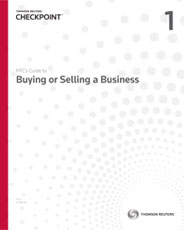Frequently asked questions about the tax side of due diligence during mergers and acquisitions.
Jump to:
| What is tax due diligence? |
| Who conducts tax due diligence? |
| How long does tax due diligence take? |
| Key components of tax due diligence |
| Navigating due diligence results |
Whether it is to gain market share, drive growth, enhance value, or expand geographically, the rationale behind mergers and acquisitions (M&As) can vary from company to company. Regardless of the catalyst behind M&A activity, what never wavers is the critical importance of due diligence in the M&A process. This includes tax due diligence.
For those accounting professionals looking to steer their careers in a new direction, working for an M&A consulting firm and helping clients achieve successful business outcomes can be a rewarding and lucrative opportunity.
According to recent data by Statista, the projected transaction value in the M&A market within the U.S. is anticipated to hit $1.09 trillion in 2024. In fact, when compared globally, the U.S. is shown to have the highest transaction value in the M&A market. The data also found that the average transaction value in the U.S. in 2024 is estimated to be $329 million.
The reality is that deals have a greater success rate when there’s effective due diligence. Due diligence mitigates risk and translates into better outcomes as it helps companies and investors better understand the nature of the deal.
It is important to note, however, that due diligence is a broad term. It encompasses several types of due diligence, including tax due diligence, financial due diligence, and legal due diligence, among others.
To help accounting professionals better understand tax due diligence, this article will explore the following:
- What is tax due diligence
- Who conducts tax due diligence
- The components of tax due diligence, and more.
What is tax due diligence?
Tax due diligence seeks to determine a company’s maximum potential tax exposure, its tax position, whether it may owe any back taxes, and where it can reduce its tax burden in a merger.
While due diligence is often thought of from a buyer’s standpoint, the seller can also benefit from tax due diligence. By engaging a seller-side tax due diligence team, a seller can more effectively review its business, identify risks, and create and implement a remediation plan to address any tax-related issues. By doing so, sellers can mitigate or eliminate issues before they are discovered by the buyer’s tax due diligence team.
Who conducts tax due diligence?
Who conducts tax due diligence? Is it a CPA or attorney? The short answer is both.
Clients typically will hire an outside CPA firm that has an M&A tax department, and those firms commonly hire attorneys.
“A law firm may be hired to do due diligence from a tax perspective but often they are looking at it more from a legal perspective. Are the legal documents executed correctly and is the target company compliant with the legal-type of agreements? Maybe there’s an IRS issue? If they are in tax litigation, that stuff will be looked at by an attorney but, overall, it is probably going to be a CPA or a CPA firm that employs attorneys,” explained Shaun Hunley, Tax and Accounting Executive Editor at Thomson Reuters.
It is worth noting that, while tax due diligence can be handled in-house, it is not common practice. Most companies will turn to an outside M&A consulting firm to conduct tax due diligence, and there are several reasons why:
- Using in-house employees to conduct due diligence increases the risk of an internal leak concerning the potential deal. Most companies prefer to keep M&A deals confidential until the transaction is closed.
- Those internal experts who are involved in the M&A process are usually focused on integration-related aspects of the deal, rather than due diligence. They act as a liaison between the companies and the outside CPA firm, facilitating communications between the buyer and seller, helping to arrange interviews with top management, etc.
How long does tax due diligence take?
The tax due diligence process varies in duration — depending on the type, size, and complexity of the deal — but it can last up to six months in some cases. In most instances, it takes between one and three months.
For instance, if a company is acquiring just the assets of an acquisition target, it is likely that the process will be shorter in length, potentially three weeks to a month. However, the acquisition of stock or ownership interest is often more complex and may require greater due diligence.
“If you are buying the stock of a company or ownership interest, that is a little bit riskier for the buyer because of something called successor liability. The one buying the company could be on the hook, legally, for taxes that are due when they are buying stock. So, they do due diligence a little bit more and it’s more in depth,” said Hunley, who noted that such deals could take between two to three months depending on the size of the acquisition target.
Furthermore, the type of company (i.e., partnership, LLC, S Corp, C Corp) can also impact the complexity and duration of tax due diligence.
 |
BookGet targeted guidance on the unique and varied strategies associated with mergers, acquisitions, and the restructuring of an existing business with PPC’s Guide to Buying or Selling a Business. |
Key components of tax due diligence
Conducting tax due diligence can be boiled down into three main components: the information request list, interviews with top management, and the quantitative analysis. Let’s look at each phase.
-
Request list
The information request list should begin with the buyer’s basic requirements and expand to include specifics related to the transaction. For instance, the tailored list takes into account the type of deal (i.e., is it a stock or asset deal) and the structure of the acquisition target (i.e, an S Corp, C Corp, partnership, LLC).
In general, request lists will include, but are not limited to:
- Previously filed tax returns. Based on the statute of limitations, it is common to request tax returns for the past three years. When examining tax returns, the tax due diligence team will look to ensure that the returns were filed on time, whether the acquisition target has taken any incorrect tax positions on the returns, whether there are any aggressive positions that could lead to an audit or exposure of tax liability, etc.
- Financial statements, which usually have explanatory notes that provide details about the company’s tax situation (i.e., tax rates, uncertain tax positions, etc.).
- The company’s income tax provision to help determine tax risks, tax liabilities, tax credits and deductions, etc.
- If it is an S Corp, trust documents may be requested to determine if there are eligible shareholders.
-
Interviews
After reviewing the requested tax documents and related information, the tax due diligence team will then conduct interviews with management, usually a tax director or chief tax officer, of the target company to address any tax-related questions and concerns.
-
Quantitative analysis
The third key phase is the quantitative analysis, during which the tax due diligence team will analyze all of the information to quantify the potential tax exposure the buyer could face, if any.
For example, in reviewing the tax returns, the tax due diligence team may find that the acquisition target incorrectly deducted expenses for property improvements versus capitalizing the costs and then depreciating those costs over several years. As a result, the taxable income of the acquisition target may actually be higher than originally reported to tax authorities.
The tax due diligence team may also find that the acquisition target claimed tax deductions they were not eligible for or claimed ineligible tax credits, like the research and development (R&D) tax credit. If the company took advantage of tax credits or deducted expenses, the team should be asking if it properly documented its eligibility for those items.
“At the end of the day, you are going to submit a report to the client outlining everything that you found and also giving suggestions as to what they should do, either from a deal perspective or things to remedy [the exposure]. If they do buy the company, what should they do in the future to make it right?” Hunley said.
Navigating due diligence results
Should a tax liability or potential exposure be identified during the tax due diligence process, it is then up to the buyer to determine how best to proceed.
“In most cases, if you have a stock deal, the buyer is probably going to be on the hook if there is an exposure that is found out later by the IRS. That is if you are just buying stock,” said Hunley. “In a lot of situations, where you are just buying the assets, you are not necessarily going to be on the hook—the seller would be.”
If a tax liability or potential exposure is found, it isn’t likely to kill the deal, but the buyer may then ask for a deduction in the purchase price and create an indemnification clause.
“In almost all situations, the buyer will ask for an indemnification. This is going to be an agreement that is in the purchase price agreement that basically says the seller is going to indemnify the buyer in case the IRS does come back and ask for money. So, even though the buyer is legally on the hook, they can then look at this indemnification agreement, go back to the seller, and the seller will reimburse them at some point,” Hunley said.
Clearly, tax implications can be significant for companies when looking to make an acquisition, which is why tax due diligence is such an important part of the M&A process.
For accountants considering a career in M&A advisory, conducting due diligence requires a keen eye for detail and can be demanding, but also offers opportunities to play a vital role in shaping successful business outcomes.
“It is a great way to earn extra revenue. If you are looking for a way to supplement your income from doing tax returns and you want to get more into an advisory space, this is a great way to do it,” Hunley said. “You will broaden your experience and your tax technical knowledge.”
To learn more about what a buyer needs to look for in an acquisition, check out the Practical Law Tax Due Diligence in M&A Transactions Checklist.
 |
Blog |





